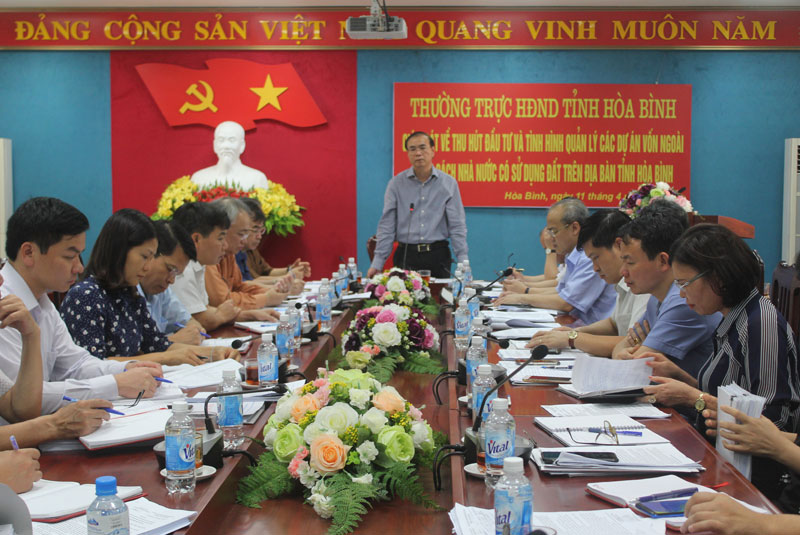
(HBO) - On April 11, a delegation from the provincial People’s Council led by Vice Chairman Hoang Van Tu inspected investment attraction and management of delayed projects using non-State capital and land in line with the Law on Land and the Law on Investment.
As of December 31, 2018, there were 525 projects in the
locality, including 39 foreign invested ones with a total registered capital of
670 million USD and nearly 430ha of land and 486 domestic projects valued at about
65.5 trillion VND and roughly 37,400ha of land. As many as 197 projects have so
far been terminated and revoked, including 19 FDI ones.
As of the late December 2018, 270 projects were put into
operation, 44 underway, 137 dealing with land procedures, site clearance and
other procedures, 35 delayed, 20 shut down production and trade, and 19 suspended.

Vice Chairman of the
provincial People’s Council Hoang Van Tu speaks at the event.
Vice Chairman of the provincial People’s Council Hoang
Van Tu suggested that the council should promptly study and issue a resolution
on the issue. The provincial People’s Committee will continue directing
investment attraction, earmarking local State budget to attract investment,
build infrastructure at industrial zones and complexes, prepare clean land sites
to draw investment, review delayed projects and offer all possible support to
investors. The provincial Department of Planning and Investment will advise the
provincial People’s Committee to issue decentralised management regulations for
projects using non-State budget, work more closely with State management
agencies to deal with administrative procedures, provide online public
administration services, especially in investment, construction, land, taxation
and finance, and improve the efficiency of choosing and evaluating projects.
The Standing Board of the Hoa Binh provincial Party Committee has agreed in principle on a proposal by the Standing Board of the Party Committee of Hoa Binh city to gather feedback on the city’s 1:2000 zoning plan, which forms part of its broader urban development strategy.
Hoa Binh province has made notable progress in public administration reform and digital government development, with the satisfaction index among citizens and businesses reaching over 84%, according to recent government evaluations.
Thanks to great efforts by local authorities in recent times, the governance and public administration performance of Mai Chau district has been significantly improved.
In the afternoon of June 6, the Party Committee, the People's Council, the People's Committee and the Fatherland Front of Lac Son district solemnly held a meeting to celebrate the 139th anniversary of the district's founding (1886–2025) and the 79th anniversary of the establishment of the district's Party Committee (1946–2025). There was the attendance of Mr. Bui Van Thang, the Vice Chairman of the Provincial People's Council; Mr. Quach Tat Liem, the Vice Chairman of the Provincial People's Committee; Ms. Dang Bich Ngoc, the Deputy Head of the National Assembly Delegation of the province; as well as the former leaders of the province and district through various periods, who are the natives of the district.
Implementing the Politburo’s Resolution No. 57-NQ/TW on breakthroughs in science – technology, innovation, and digital transformation is a golden opportunity for the northern mountainous province of Hoa Binh to renew growth model, improve competitive edge and shorten digital gap.
Resolution 57-NQ/TW, issued by the Politburo on December 22, 2024, identifies sci-tech, innovation, and digital transformation as strategic breakthroughs to build a developed and prosperous nation. In Hoa Binh province, this spirit is not just a slogan, it’s being put into action through concrete initiatives that form a "new development triangle”: digital citizenship, digital economy, and digital administration.



